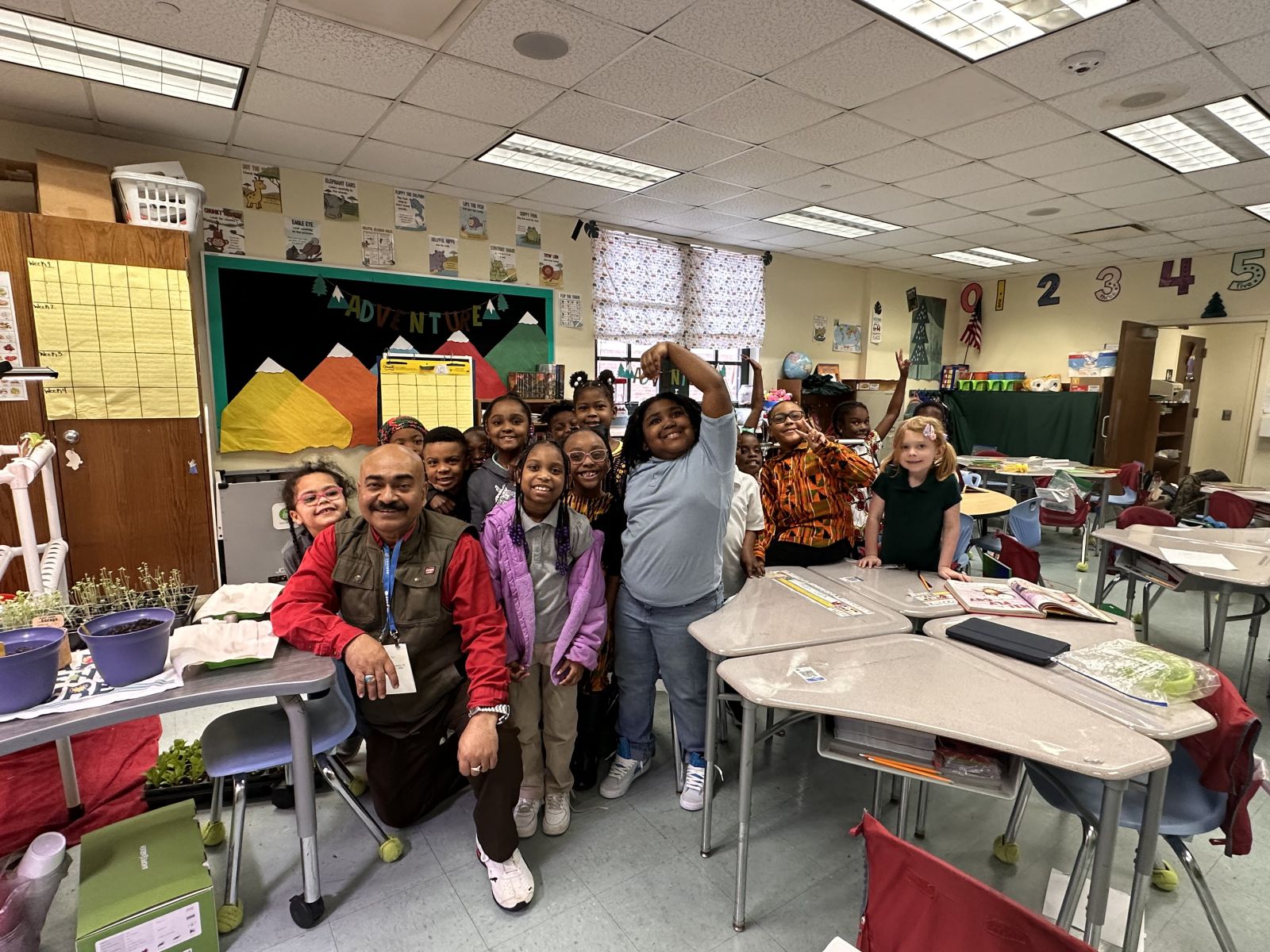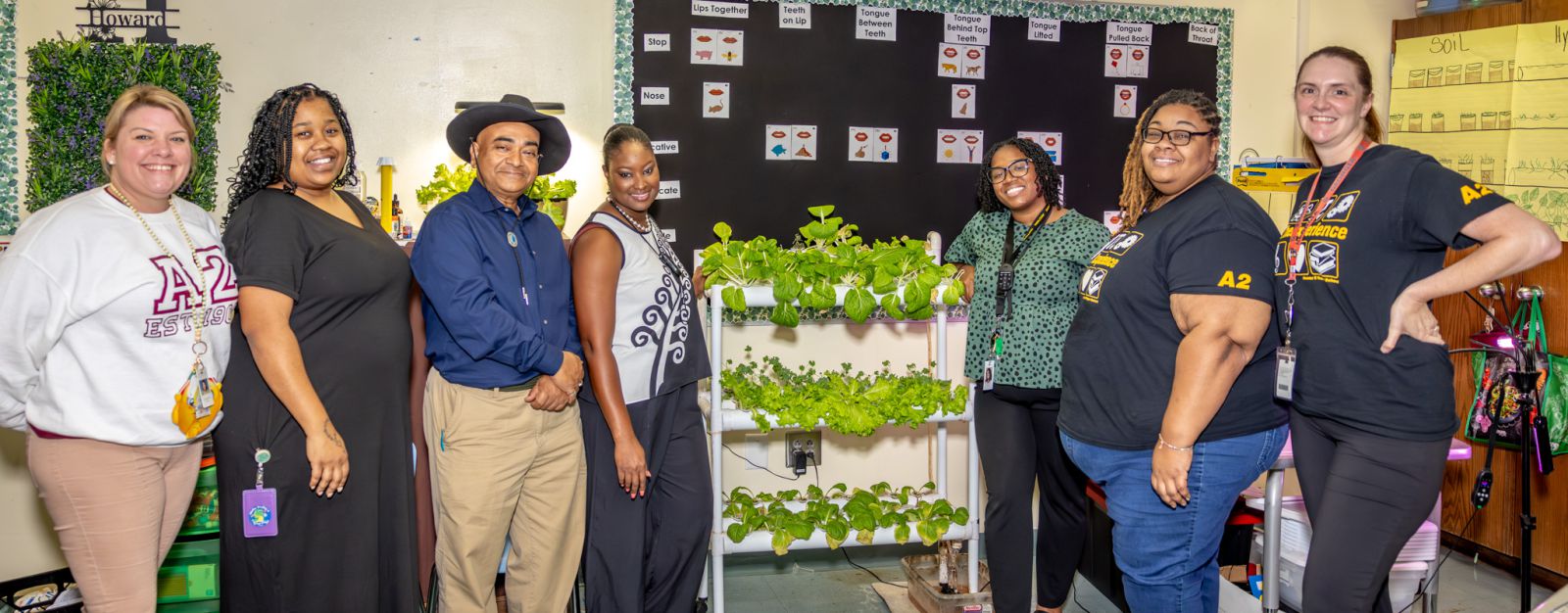News and Press
Growing future agricultural scientists
Posted on Jul 22, 2025 at 11:27 AM

Researcher Bipul Biswas, Ph.D., smiles with first graders at Alexander II Math and Science Magnet School.
First graders at Alexander II Math and Science Magnet School in Macon, Georgia, experienced growing vegetables in materials other than soil for their annual project.
Dr. Bipul Biswas, a Fort Valley State University (FVSU) professor and researcher, lent his skills to this educational and fun opportunity during the summer of 2024. The distinguished scientist, specializing in research on specialty plants like stevia and turmeric, initially connected with first-grade teacher Carissa Howard in 2023.
Howard, who oversees science, technology, engineering and mathematics (STEM), coordinated a problem-based learning activity for the year, where first graders explored ways to increase healthy food options while living in a food desert.
To help expose students to the process of growing food without soil, Howard needed a specialist in hydroponics. She came across FVSU research articles about Biswas’ work after doing a Google search and invited him to visit the school.
For four weeks this summer, Biswas introduced Howard’s class of 21 students to various methods of growing romaine lettuce. First, Biswas showed them the makeup of a plant – the stem, roots and leaves. Then, the young researchers compared the efficiency of using daylight versus blue, red and white lights. Biswas said the students discovered that daylight and red lights are similar in how effectively they grow plants. He taught them simple growing methods using red and clear Solo cups. He also showed them how to grow plants using the deep water culture (DWC) hydroponic system. This method involves the plant’s roots being suspended in a well-oxygenated solution composed of water and nutrients.
“Hydroponics uses no pesticides and takes less time,” Biswas noted, applauding the students for their interest and diligence. “Our future generation is realizing through this kind of program that agriculture can be done indoors, dirt-free and faster.”
Furthermore, Biswas emphasized the significance of agriculture and youths learning how to care for their plants with love.
“Plants understand. When you love and talk to them, they will grow well,” he recalled telling the first graders. “This helps ease the students' frustration and shows empathy. This is more than about just agriculture.”
Howard remarked the students were thrilled to engage in this type of research with Biswas, who provided many of the materials.
“He was the blessing I knew I needed,” she said. “He was all of that and more.”
Howard, who visited FVSU’s Specialty Plant House, added she has a bulletin board highlighting their yearlong project. The students also created a book dedicated to Biswas about all that he taught them.

Biswas and teachers at Alexander II Math and Science Magnet School showcase one of the hydroponic systems the students are working on.
“It was insightful,” Howard chimed. “Oftentimes, they don’t correlate that food doesn’t just appear. It was interesting to see how little they knew where food came from. They knew that plants grow, but they had to make the connection that plants are food. They now explain to other students how to use hydroponics and that it helps save water.”
Like Biswas, as part of her curriculum, Howard taught her class the different parts of various plants such as the sunflower, celery and spinach.
“The exercise gave them the foundation they needed,” Howard said. “They shifted their thinking. That one activity showed them to look at plants as food. They now look at French fries as potatoes.”
To celebrate their new gardening skills, the students made chicken wraps using their harvested lettuce from the DWC system. Howard wants to continue partnering with Biswas for future classroom projects because of his genuine commitment to educating students.
“We are learning how to provide for ourselves and families in ways to benefit many people in a short amount of time,” she said.
Biswas returned to the school in August to work with four additional classes, totaling approximately 80 students. He helped each group set up similar hydroponic systems.
- Categories:
- FVSU Agriculture College
- Tags:
- Research
Media Contact
- Latasha Ford
- fordl@fvsu.edu